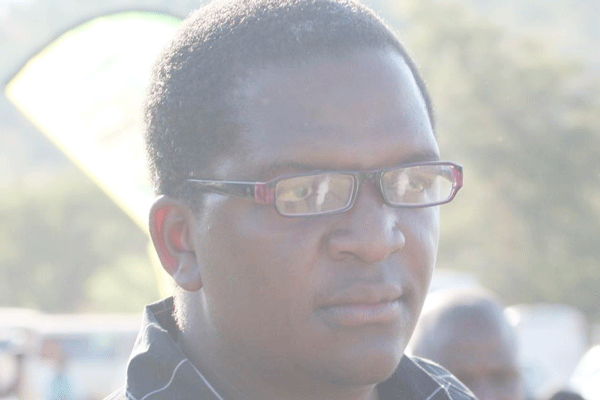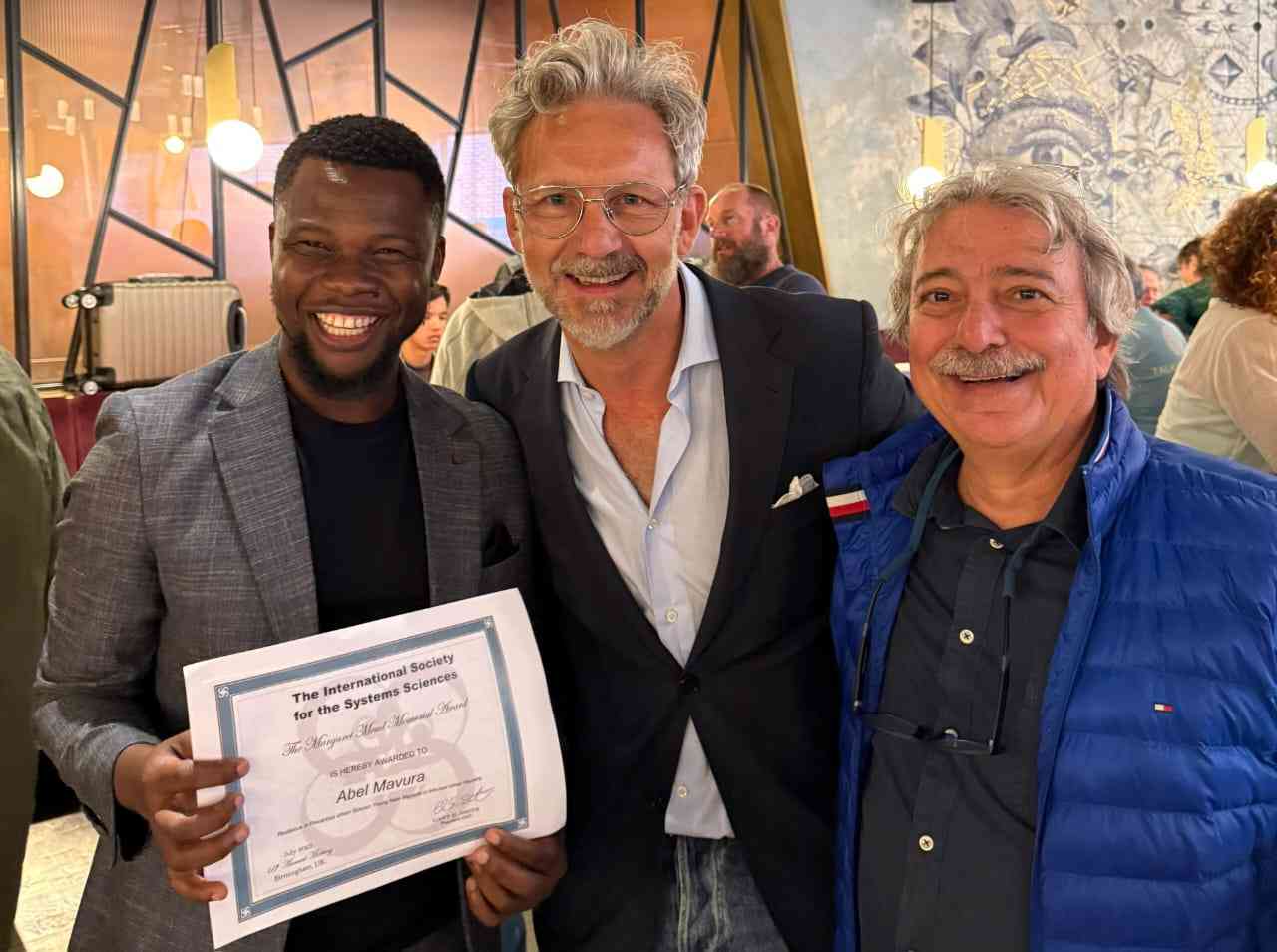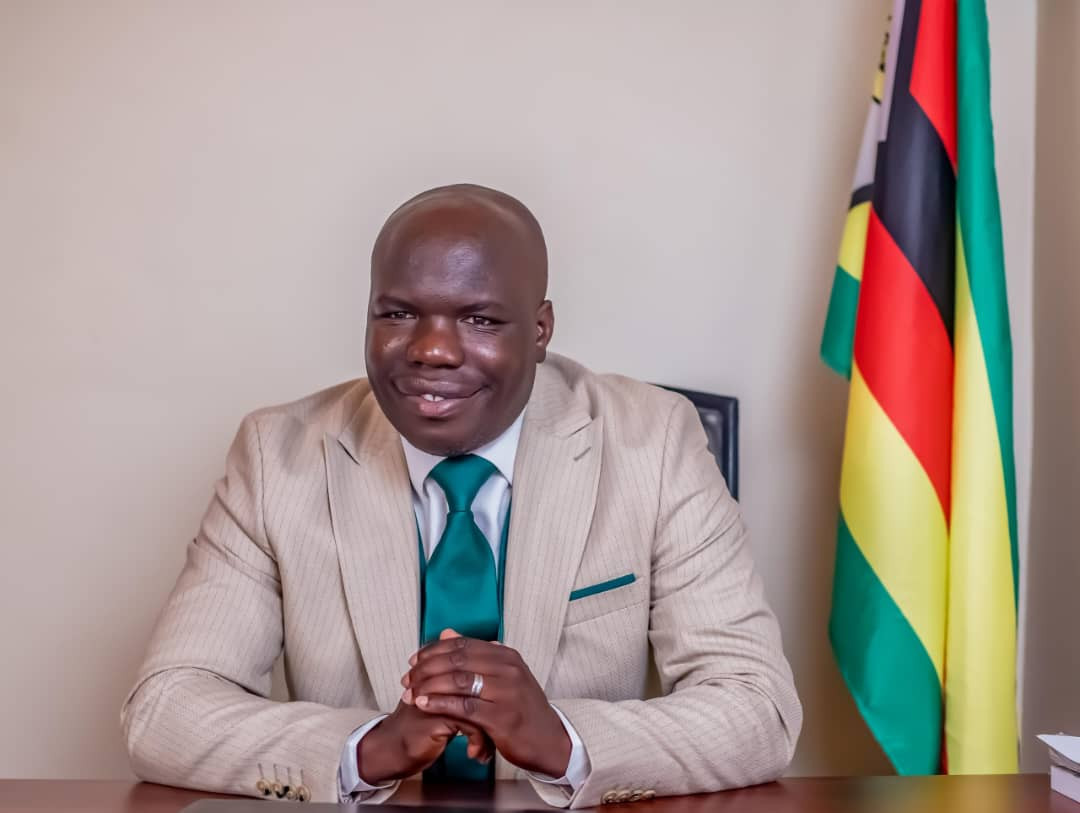
By Onai Mushava
A silver linings playbook is a mental deposit of bright spots in an otherwise dark space. If you are a young journalist just trying to get or chase some shine, you will need the playbook as much as you will need your notebook. You will need all the positivity you can gather because the newsroom is the place that will drain your energy like a Bitcoin farm and question your humanity like a Rhodesian kitchen. During my own time in the newsroom, the silver lining was my privileged access to talents I had always admired and the joy of being acknowledged by them as a peer. That is how I felt when I first met Godwin Muzari.
It was an October 2013 afternoon. I might have already heard Muzari’s name from my chatty fellow interns or I might have pinned his face to his Drumbeat column. Whatever the case, I knew was in the presence of journalism royalty when I ran into this tall newsman in a Herald House elevator. “Don’t you want to give your old man a hand?” he said, giving me some parcels to hold for him.
In fact, he was just 32, beginning a new phase as The Herald’s entertainment editor, having served The Standard in a similar position. Each time you looked over your shoulder in the newsroom, someone would be reminding you of the divine rights of their seniority over you, but Muzari was different. He was a writer in the artistic sense of the word and he acknowledged you if you were one too. Although I was not on his desk, he assigned me to maintain a Yesteryear Profile that became a brief forerunner to his much-loved Memory Lane column. A few months later, he gave me a music column to maintain between internship and college.
Godfather, as we affectionately called him, would tell me which music legend to profile for the particular Monday and coach me on how to go about it. He changed the heading of his first assignment for me to Biggie Tembo Lost Spiritual Battle, giving the story a dark slant. Looking back, it is ironic that he would choose such a title for a story about Tembo’s death by suicide. Was this his own interpretation of something he was also quietly going through, something that would force him to take his own life too seven years later? Did he, perhaps, love the game so much and blended his own life with it till it ungratefully consumed him? No one can ever know for certain. His job was to tell the stories of others while he kept his in the privacy of a quiet, enigmatic personality.
What can be objectively known about Muzari is that he was one of the best minds to step into a newsroom. His stories were well-circulated, discussed and acted on. Whatever you thought of him, you could not question his journalistic stature. I reached out to some of the people who knew and loved him most. Friends and colleagues spoke and paused through the pain, but they all held on to the consolation of the greatness that Godfather was able to pack within his short life.
Together, they shared their impressions of him as well his greatest moments in the newsroom.
“We shared the same room in Warren Park D and moved as a pack. We were young and wild and we picked up quite a reputation as the neighbourhood journalists,” sports biographer and journalist Albert Marufu remembered the 2006 to 2008 period when he, Muzari, and Trust Khosa were friends and workmates at the now-folded Daily Mirror.
- Chamisa under fire over US$120K donation
- Mavhunga puts DeMbare into Chibuku quarterfinals
- Pension funds bet on Cabora Bassa oilfields
- Councils defy govt fire tender directive
Keep Reading
“Trust brought a small claypot and a beer ladle from the Miss Rural pageant. We would fill the claypot with beer, place it on a stage, request the bartender to play Mbira Dzenharira and tell everyone to come and scoop their fill. Wild as we were, we inspired the few youngsters in the neighbourhood to become journalists. I am particularly thinking of Edwin Mwase and Gold Guvamatanga who was our landlord’s son,” said the Memory Mucherahowa biographer who went on to work with Muzari at The Standard and enlist him as his best man at his wedding.
Marufu recalls Muzari as a journalist of exceptional memory. Perhaps, there are two things to be said about this. First, Muzari’s unusual ability to sit through an event without writing notes and but still yield a colourful copy, and then his role in ensuring that Zimbabwean arts’ yesteryear canon is never forgotten.
From reaching back to tell the famous story of Gogo Dembo to rousing fans out of lockdown amnesia to consider the plight of artistes like Franco Slomo, his memory prompted others to action. Sometimes, his stories led to savage clapbacks from artistes who preferred to be celebrated but not scrutinised. His looking-back pieces did not simply splatter colour onto the archives, but mined new details and humanised his subjects, as his interviews with Bothwell Nyamhondera, Oliver Mtukudzi and many others attest.
He crafted his copy like a patient writer, so much detail and so much perspective and yet he was still able to put everything together with simplicity and calm authority. Marufu remembers his insistence on approaching every story with writerly ambition. “He emphasised colour; I was doing sport and he was doing entertainment and both sections are defined by colour. He would emphasise reading in order to achieve colour. I hardly saw him reading, but when the articles came out I would see him making references.” Marufu recalled.
The Mirror trio’s young “landlord”, Guvamatanga, recalled their notoriety and their formative influence in his own career. He remembered Muzari as the quietest of the trio, in love with the bottle but secretive about it.
“He had the patience and time to write the short stories and articles that I was writing and say, ‘Why don’t you enrol for journalism? There is lots of money in it; you travel a lot, especially if you go to state media.’ To be honest, I didn’t want to have anything to do with journalism, but they kept on pushing until I enrolled,” said The Patriot reporter.
“I was young then but just seeing them bring a newspaper their bylines. At my age, I am thinking about getting girls if I come out in the paper. We used to talk about girls and Gody used to advise me about that. In 2011, they were now seeing my bylines too, and we would reunite over drinks.”
Muzari and Khosa would reunite at Zimpapers, first as The Herald deskmates, and later as editors of The Herald and H-Metro’s arts desks respectively. “When The Mirror folded up, both Godwin and Trust came. I could not keep both at The Herald. I had Trust. So, I spoke to Mazara at The Sunday Mail. He agreed to take him in, but he could not stay. Godwin was not happy. When he came back to The Herald, he felt uneasy because of a lot other stuff going on. Eventually, he left,” desk honcho Wonder Guchu remembered.
“He needed space, which he didn’t have at the time. It was why, I guess, he left for The Standard.”
Every colleague seemed to remember Muzari’s writerly ambition.
“He never wrote dry stories. He always had a story to tell, not just information to churn out. Just check the Chimbetu stories he did. Always there was something new. If thinking long and deep is a weakness, then yes I would say Godwin had that kind of thing. Slow deliberation but fruitful in the end,” Guchu remembered.
With this deliberation came the desire to tell a different story. According to Guchu, this shows in a more recent story when Muzari convinced Daisy Mtukudzi to open up on her husband’s last moments, while colleagues went for historical details when Tuku died.
As arts editor at The Standard, Muzari would pass on his best qualities to peers.
Silence Charumbira remembers picking up the virtue of being a listening journalist from Muzari and well as his attention to detail. A highly functional drinker, he would piece an accurate story together besides being sloshed at events.
“He was both eccentric and enigmatic. It was difficult to decipher. At face value, he would strike you as a coy but tough man. He enjoyed it when people thought of him as such. But he was soft and extremely friendly,” Charumbira said. In fact, the Lesotho-based journalist remembers Muzari as a brother more than as a boss.
As far a touching up pieces with colour, Charumbira remembers Muzari appealing to imagination for a piece on a newly emerged rhumba artiste.
“I particularly remember his analogy of Energy Mutodi’s then budding music career comparing it with one Faifi Maera (Five Miles), a young man from his Mashonaland Central province home who enjoyed running so much that he would call any distance five miles,” Charumbira said.
“His point was that Mutodi would last the distance in his career in the same manner that Faifi Maera would always complete the distance that he would have said he would run. After the article, we would always joke about Faifi Maera being a creation of Muzari’s.”
After The Standard phase, Muzari distinguished himself as a mentor of new talent including Tawanda Marwizi, the late Sophia Chese and Yeukai Karengezeka at The Herald.
“During the time I worked with him since 2013 to date, I realised that he was a person who didn’t like ordinary stories like so-so has released an album or has thrilled fans. He wanted wanted stories that go beyond that,” Karengezeka remembered.
“He also enjoyed giving the background of the person before getting into his main subject. He liked the descriptive style of writing that made a reader feel attached to the story.
“I can also say he liked to write more of the lifestyle pieces of the celebrities and would commit to personally visit them at their homes or at the studios. He didn’t like phone-call interviews most of the time.”
While most of Muzari’s well-remembered stories were on music, he also forayed into other genres. Karengezeka remembers retrospective pieces on Paraffin, Mai Sorobhi, Chibhodhoro and Mukadota as some of Muzari’s best. The stories went beyond the surviving artistes he interviewed to explore lesser-known details of their relationships with the legends they worked with.
As an arts journalist, Muzari had an eye for the timeless. When all is said, his defining quality is the timelessness of his own work.











